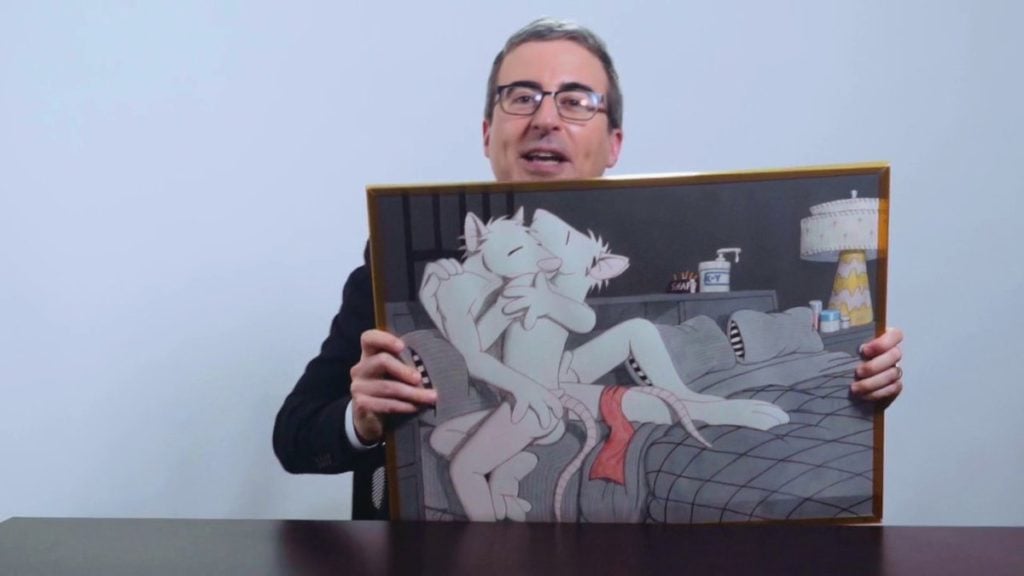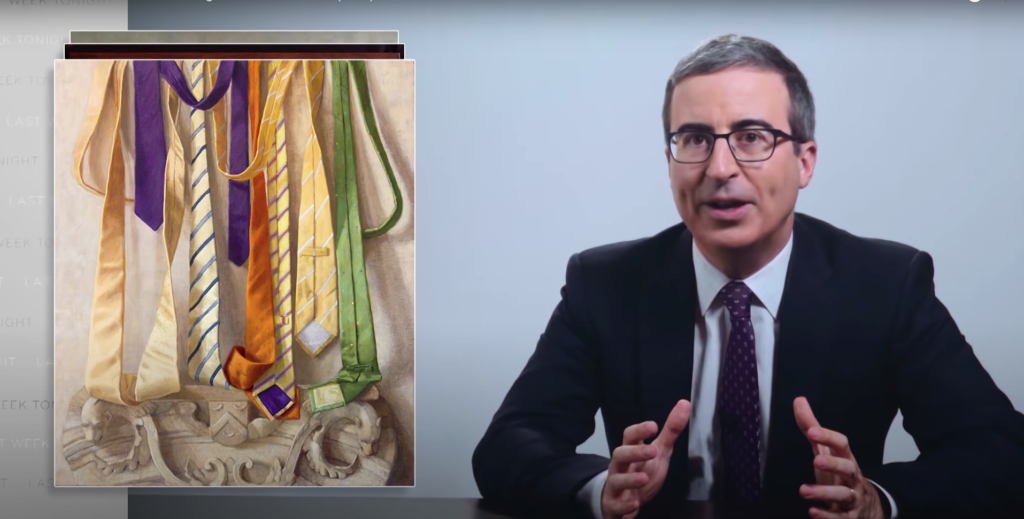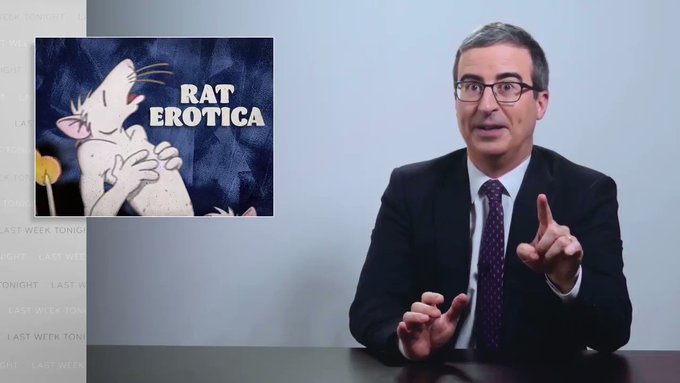Art World
Comedian John Oliver’s Dearest Wish Was to Own a 28-Year-Old Painting of Rat Erotica. Last Night, He Successfully Bought It (for $1,000)
The HBO host also donated an additional $20,000 to charity.

There’s the search for the holy grail, the fountain of youth, and now, a 1992 painting of two rats doing it.
These objects have led to some of the greatest quests in history. And Sunday, comedian John Oliver, the host of the weekly HBO show Last Week Tonight, ended one of them in epic fashion.
Two weeks ago, the comedian discovered a painting of two anthropomorphized rats while watching a recording of a televised art auction for a local PBS media partner in York, Pennsylvania, WITF. Oliver vowed to find the painting, which depicts the vermin holding each other in a tender, late-night embrace, and offered to pay $1,000 for it, plus a $20,000 donation to charity as a finders fee.
This weekend, the host delivered on his promise.
“I believe I have something you’re looking for, world. I believe I have something we’ve all been looking for,” Oliver said while pulling the 28-year-old erotic work out from under his desk. Stirring music swelled in the background as he hoisted the piece above his head: “And it’s called hope!”
The painting, it turns out, was done by a man named Brian Swords, an artist known within the furry community (and who—as if his real name wasn’t badass enough—operates under the pseudonym Biohazard). The work inspired a kind of cultish interest among house-bound internetters in the last few weeks. Newsweek even tracked down the artist and the producers of the WITF auction, but the location of the painting—and the person who purchased it for a cool $80—remained a mystery.
Oliver set up a devoted email account for information about the artwork, to which he received numerous fan-made examples of furry art, including several rat sex scenes, a portrayal of the host himself as a sexy vermin, and one, inexplicably, of two seaside koalas giving each other chlamydia.
Then he received a particularly intriguing email, the body of which simply read, “I believe I have something you’re looking for.” Attached was a picture of the painting next to that day’s newspaper.
“Is this what America needs most right now? No, of course it isn’t. America needs a vaccine, more ventilators, a different president and also just a quick break,” Oliver said on the segment. “But you know what would be nice in the meantime? A victory. And managing to track down that painting would definitely be a win because what are the chances that, in 1992, in south-central Pennsylvania, a man would have made an impulse purchase of high-quality rat erotica and then, instead of throwing it away at literally any point in the past 28 years, kept it, cherished it, framed it, not knowing that one day, far in the future, it might force HBO to donate $20,000 Pennsylvania food banks in the middle of a pandemic.”
“It sounds impossible,” he continued. “There’s no chance, right? But if that person could do all that, so that painting could find its way to me, then there’s no limit to what we can do, my friends. To what we have already done.”

Incidentally, the animal erotica wasn’t the only artwork to make an appearance during Oliver’s last show. The host also featured the still life paintings of Judy Kudlow, the wife of national economic council director Larry Kudlow, which bizarrely depict her husband’s ties. Despite being married to a high-ranking White House official reportedly worth over $2 million, Judy Kudlow applied for a small business bailout.
Oliver also put out a call to his audience for one of Kudlow’s works of art, offering to pay $10 (the price of which was determined by its quality in comparison to that of Swords’s painting) and another $20,000 donation to a local food bank.
Follow artnet News on Facebook:
Want to stay ahead of the art world? Subscribe to our newsletter to get the breaking news, eye-opening interviews, and incisive critical takes that drive the conversation forward.

It looks like you're using an ad blocker, which may make our news articles disappear from your browser.
artnet News relies on advertising revenue, so please disable your ad blocker or whitelist our site.
To do so, simply click the Ad Block icon, usually located on the upper-right corner of your browser. Follow the prompts from there.
SHARE
Article topics




No comments:
Post a Comment